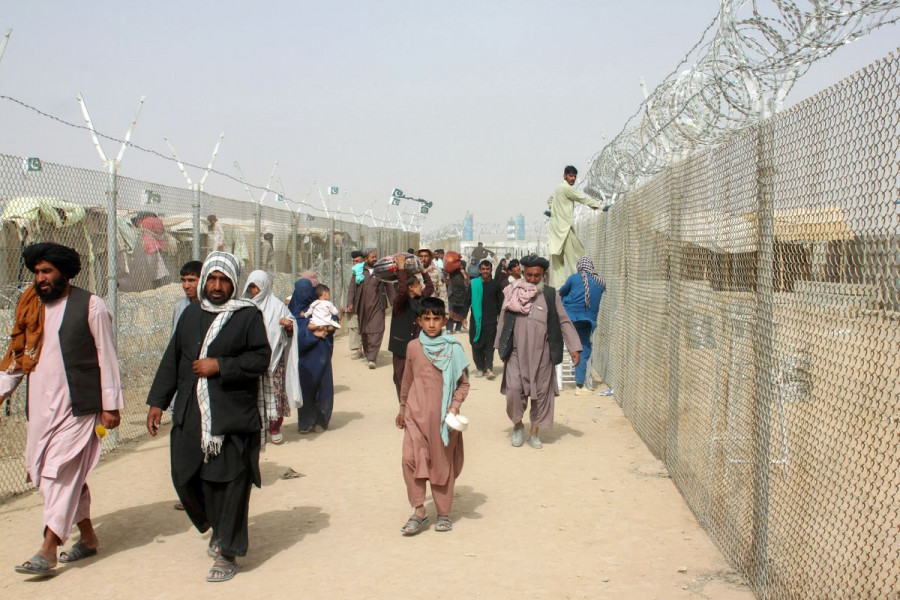Some say Nepal as SAARC chair should take the lead, but observers say there’s not much scope, as even world powers are struggling to figure out how to deal with the new rulers.

People arriving from Afghanistan make their way at the Friendship Gate crossing point at the Pakistan-Afghanistan border town of Chaman, Pakistan August 16, 2021. Reuters
Nepal does not have a direct stake in Afghanistan. It doesn’t even have an embassy in Kabul. Nepal, however, has a couple of connections. Afghanistan is the youngest member of SAARC, of which Nepal is the current chair, and there are many Nepalis working there.
As the country has fallen to the Taliban—the Islamic militants made rapid advances and took control of Kabul on August 15–the South Asian country is in flux.
The Taliban takeover of Afghanistan can threaten regional peace and change geopolitical dynamics. Its impacts on Nepal cannot be ruled out.
Amid sporadic calls that Nepal, in the capacity of the chair of SAARC (South Asian Association of Regional Cooperation), take initiatives to start dialogue with member countries, at least five former ambassadors on Tuesday issued a statement, making a similar pitch, stressing the need for addressing the emerging challenges in Afghanistan.
“The political advancement of the Taliban in Afghanistan is indeed a subject of concern to all SAARC member countries,” the ambassadors who have served in India, China, Russia, the United States of America and the United Kingdom in different times, said in the statement. “The evolving situation in Afghanistan can have a far-reaching consequences on the region’s socio-economic, migration and security realms.”
But questions remain.
Given the magnitude of the crisis unfolding in Afghanistan where the United Nations and the world’s powerful nations are concerned and engaged and struggling, how much impact Nepal can make. And if Nepal indeed makes a move, what kind of template should it build and follow?
Diplomats and foreign policy observers say that it is highly unlikely that Nepal will make such a move, despite the fact that the Taliban takeover of Afghanistan can trigger geopolitical flux and threaten regional peace and security. The SAARC charter itself does not allow any member state to speak on internal matters of any other member, according to them.
“We also need to understand that SAARC does not have a security and political mechanism like other regional bodies like the European Union or the African Union,” said Madhuraman Acharya, a former foreign secretary and ambassador. “Though Afghanistan is in South Asia, the recent takeover is a global crisis and major powers and the United Nations are already deeply concerned and engaged.”
According to Acharya, when SAARC itself is in a moribund state, any role Nepal can play is just far-fetched.
“The regional bloc’s charter clearly bars discussions on security, domestic and political issues of any member state,” said Acharya.
The refrain that Nepal should “do something” started immediately after the Taliban returned as in charge of Afghanistan. On Saturday, a group of civil society members and human rights activists said that Nepal should initiate an emergency regional consultation to address the humanitarian and security issues of Afghan citizens and prospective refugees.
In a statement, they said that Nepal must, if necessary, be prepared to give asylum to the fleeing Afghans irrespective of their religion and gender.
The Taliban’s return to power has instilled fears among many Afghans, and scenes have emerged from Afghanistan of people trying to flee the country. Some horrific videos have appeared showing Afghans clinging to the outside of planes just as they revved up to take off.
Suresh Chandra Chalise, who has served as an ambassador to the United States and the United Kingdom, says since the SAARC charter does talk about the well-being and stability in the region, Nepal, as the chair, has the obligation to take initiatives.
“Nepal can at least express concerns before the member states to discuss how we can maintain regional peace,” Chalise told the Post.
Chalise is among the ambassadors who issued the statement on Tuesday. Others are Nepal’s former ambassadors to India Deep Kumar Upadhyay and Durgeshman Singh, Nepal’s former ambassador to Russia Hiranyalal Shrestha, and Dr Mahesh Maskey, Nepal’s former ambassador to China.
“The security situation, the socio-economic impact and migration issues are going to be a huge challenge for the region in the days to come,” said Chalise. “Nepal as the SAARC chair has not consulted with the secretary general of the bloc yet about the emerging situation in Afghanistan. It’s high time Nepal figured out a way and called member states for consultations.”
Nepal so far has said its utmost priority is evacuating Nepalis out of Afghanistan. Kathmandu has not made any official statement pronouncing the Taliban.
“Currently our priority is bringing back our citizens from Afghanistan,” said Sewa Lamsal, spokesperson for the Foreign Ministry. “On Afghanistan and recent developments, we have already made our position clear.”
As of Tuesday, a total 770 Nepali nationals have been evacuated out of Afghanistan, according to the ministry.
“We have requested all our friendly nations to help evacuate our citizens,” said Lamsal.
Two days after the Taliban took control of Afghanistan, the Ministry of Foreign Affairs on August 17 said that the government of Nepal has been closely following the recent developments in Afghanistan.
“Nepal wishes to see lasting peace and stability in Afghanistan, a fellow member of SAARC, and the continued progress and prosperity of the friendly people of Afghanistan,” read the Foreign Ministry statement.
Officials last week told the Post that Nepal will pursue a “neutral” position on Afghanistan, in an indication that it will assess the situation before taking a decision on recognising the Taliban as the new rulers.
Even almost two weeks after the takeover, the Taliban themselves appear to be in a state of confusion. Reports suggest they are holding discussion on government formation, as a smooth power transfer could not take place because Ashraf Ghani, the Afghan president, fled just as the Islamic militants took control of Kabul.
Government officials say the calls for Nepal to make a move at a time when Afghanistan itself is in transition is a bit premature.
A joint secretary at the Foreign Ministry said that Nepal’s immediate priority is to rescue Nepali citizens who are trapped in Afghanistan.
“Besides that we do not have any immediate priority when it comes to the developments in Afghanistan,” the joint secretary told the Post, asking not to be named. “There clearly is a vacuum in Afghanistan. The elected regime has collapsed. There are new rulers with whom we have no contacts. We have to wait and see what kind of government is formed there and how the international community responds.”
Though the government has said it “will do what it requires” to evacuate Nepalis out of Afghanistan, it’s easier said than done. There is no data on the number of Nepalis in Afghanistan.
Since most of the Nepalis are believed to be working with various foreign missions based in the country, the government, according to officials, has established contacts with the missions to help rescue its citizens. There, however, are some Nepalis who reached the country illegally and that makes the evacuation more complicated. With the Taliban warning of “consequences” if the United States extends its evacuation plan beyond August 31, concerns are growing over Nepalis’ safety in the war-torn country.
A senior Foreign Ministry official, who also spoke on the condition of anonymity, said that despite knowing that the situation is grave, there is not much Nepal can do at this point of time.
“The government does not act just because some ‘self-enlightened’ individuals have some ‘wishful thinking’,” said the official, taking a jibe at the call of former ambassadors, all of whom were political appointees. “They must understand the fact that the SAARC charter does not allow any member state to speak on internal matters of any other member state.”
According to the official, even if Nepal makes a call for a broader discussion, there are chances some member states could refuse to participate or stay quiet.
“Anyway, the idea of Nepal asking member states to speak up is ridiculous,” said the official. “Did any member state raise the issue of the Maoist insurgency that lasted for a decade in Nepal? How can we be so oblivious to our own context?”
But even if, hypothetically, Nepal does call upon the member states to discuss the emerging situation in Afghanistan, there are questions–how to invite a country that has just been taken over by Islamic militants, who are yet to be officially recognised as the new rulers.
“Even if we invite the Taliban, what are we going to tell them?” said Arjun Bahadur Thapa, a former foreign secretary who also served as secretary general of SAARC from 2014 to 2017. “If the Taliban refuse to listen to the proposal of Nepal, if it has any, what are we going to tell them?”
According to Thapa, if the Nepal government does call for a consultation, it must have something concrete to suggest.
“There are so many issues…calling member states for consultation is not as easy as some believe,” Thapa told the Post. “Have they thought how embarrassing it would be for Nepal if any of the member states rejects the idea?”













